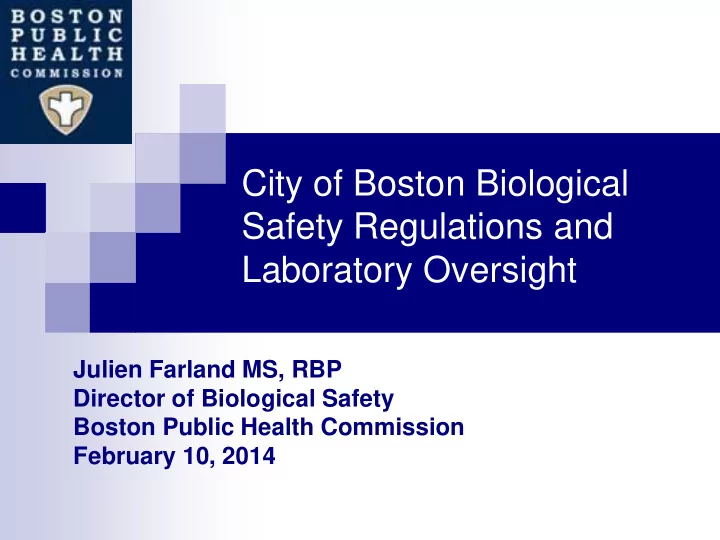

City of Boston Biological Safety Regulations and Laboratory Oversight Julien Farland MS, RBP Director of Biological Safety Boston Public Health Commission February 10, 2014
Outline Introduction to BPHC Laboratory Regulations Development of BSL3/BSL4 Regulation Specific Regulatory Requirements Boston Biosafety Committee
Boston Public Health Commission Regulations Recombinant DNA Technology: Use Regulations Biological Laboratory Regulation Disease Surveillance and Reporting Regulation
Goals and Objectives Protect the safety and health of the public and lab workers Increase public confidence and awareness about lab safety procedures and regulations Strengthen ability of Boston institutions to monitor safety by increasing role and authority of IBCs and biosafety offices Increase reporting requirements to BPHC
Development of Regulation April 2005 Advisory group of lab safety experts November 2005 Draft regulations released December 2005 – January 2006 Public hearing and written comments (60) Small and large group meetings (100+): City council, State legislature, Community reps, Scientific reps June, 2006 Revised draft regulation released September 2006 Regulations approved March 2007 Guidelines approved
Components of Regulation All BSL-3 and BSL-4 projects must be presented to BPHC at least thirty (30) days before research may begin Requires whistleblower provisions for anonymous reporting of health and safety violations Strengthens community involvement and awareness Establish permitting and penalty procedures
Restrictions Recombinant DNA use requiring containment defined by the NIH Guidelines as “BL4” shall not be permitted in the City of Boston Ban on weaponization and classified research
Permit Requirements Documentation required for all BSL3 & BSL4 research laboratories Decontamination Biosafety/Lab safety manual and Disease surveillance plan Decommissioning Emergency response plan plans Waste disposal plan Laboratory inspection procedures Security plan Strain verification Transportation plan policy Training procedures IBC roster Facility commissioning Key staff list document
Inspections Inspection of new and existing laboratories BSL3 minimum annually BSL4 mimimum twice a year Inspections may be unannounced Subject to inspection after exposures or incident Guided by detailed inspection checklist Conducted by team Review documents, staff interviews, and assessment of facility and practices
Incident reporting Upon discovery of incident Reporting requirement covers Illness Spill or accident resulting in overt exposure Unexplained absenteeism >2 days Failure of mechanical system Follow-up information must be provided to BPHC as requested
Annual Report Complete set of IBC minutes Report of QA/QI. Facility Verification, HEPA Certification, Training, Drills, Inspections, Equipment purchases, Facility Maintenance. Responsible Official’s signature on statement Annual Public IBC Meeting
Permit Fees Annual fee ranges from $2,500 to $10,000 for BSL3 laboratories. $50,000 annual fee for BSL4. Non-select agent entities must submit an annual financial statement with details of operating expenses
Fines and Citations Monetary fines Permit may be issued with conditions, revoked, suspended, modified or not renewed Immediate closure of laboratory
Community Benefits Program All entities permitted for the operation of a BSL4 laboratory shall establish and maintain a Community Benefits Programs to support local health and safety needs The entity shall file with the Commission an annual report detailing the operations of the program
National Emerging Infectious Disease Laboratory (NEIDL) BSL2 work is currently occurring at the NEIDL BPHC has worked with city agencies to prepare for emergency responses at the NEIDL. Tabletop exercises and drills, classroom exercises, and tours of the facility have occurred and are an ongoing obligation of Boston University (BU). Online Training on biosafety and the NEIDL is under development.
BSL4 Permit Review Process Review of permit application by BPHC Review of permit and projects by Boston Biosafety Committee Inspections of BSL4 laboratory space CDC review
Boston Biosafety Committee Six members of the BBC live in Boston Technical assistance to BPHC related to permit applications and emerging BSL3/BSL4 issues Review of summaries of all proposed BSL4 research applications prior to final BPHC approval Review of policies, procedures, manuals and programs adopted by individual institutions
Contact Information Julien Farland Director of Biological Safety Boston Public Health Commission Office: 617-534-2814 Email: jfarland@bphc.org Website: www.bphc.org/biosafety
Recommend
More recommend